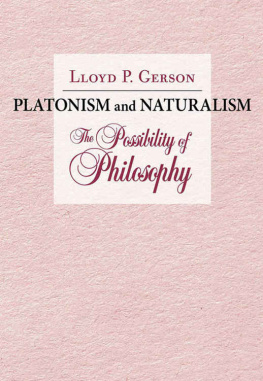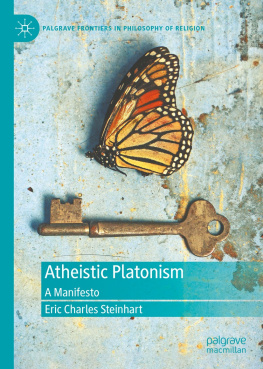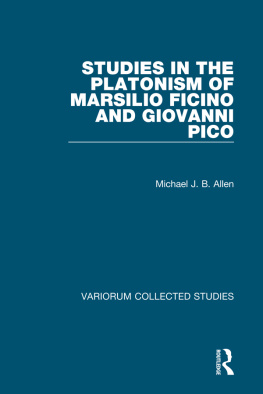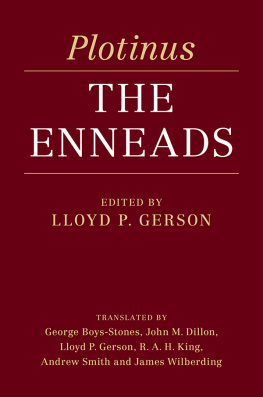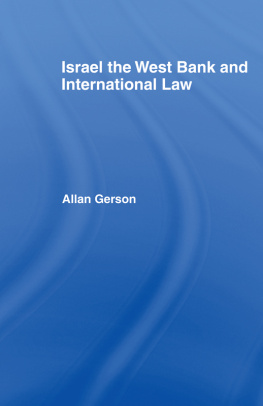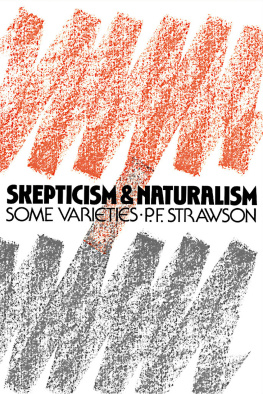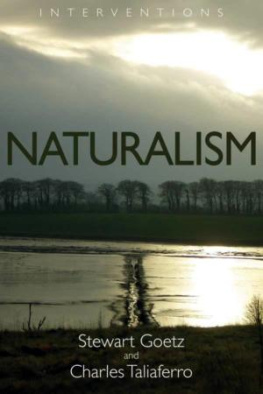Lloyd P. Gerson - Platonism and Naturalism
Here you can read online Lloyd P. Gerson - Platonism and Naturalism full text of the book (entire story) in english for free. Download pdf and epub, get meaning, cover and reviews about this ebook. year: 2020, publisher: Cornell University Press, genre: Science. Description of the work, (preface) as well as reviews are available. Best literature library LitArk.com created for fans of good reading and offers a wide selection of genres:
Romance novel
Science fiction
Adventure
Detective
Science
History
Home and family
Prose
Art
Politics
Computer
Non-fiction
Religion
Business
Children
Humor
Choose a favorite category and find really read worthwhile books. Enjoy immersion in the world of imagination, feel the emotions of the characters or learn something new for yourself, make an fascinating discovery.
- Book:Platonism and Naturalism
- Author:
- Publisher:Cornell University Press
- Genre:
- Year:2020
- Rating:4 / 5
- Favourites:Add to favourites
- Your mark:
- 80
- 1
- 2
- 3
- 4
- 5
Platonism and Naturalism: summary, description and annotation
We offer to read an annotation, description, summary or preface (depends on what the author of the book "Platonism and Naturalism" wrote himself). If you haven't found the necessary information about the book — write in the comments, we will try to find it.
Platonism and Naturalism — read online for free the complete book (whole text) full work
Below is the text of the book, divided by pages. System saving the place of the last page read, allows you to conveniently read the book "Platonism and Naturalism" online for free, without having to search again every time where you left off. Put a bookmark, and you can go to the page where you finished reading at any time.
Font size:
Interval:
Bookmark:
Platonism and Naturalism
The Possibility of Philosophy
LLOYD P. GERSON
CORNELL UNIVERSITY PRESS
Ithaca and London
Asl
Versions of some of the material in this book were delivered as lectures and conference presentations at Bar-Ilan University; Hameline University; University of California at Berkeley; Temple University; Durham University; the International Plato Society meeting in Brasilia, Brazil; Cambridge University; UNAM, Mexico City; Universidad Panamericana, Mexico City; Duquesne University; and the University of Chicago. I am grateful to the audiences at these presentations for their spirited engagement with my arguments.
Among my colleagues and friends who have read all or parts of drafts of this book are Francesco Fronterotta, Franco Ferrari, Brad Inwood, and Eric Perl. Their thoughtful and collegial disagreement with some of my ideas were as welcome as their warm encouragement. I am especially grateful to Nicholas D. Smith, who read the entire book and made extensive critical comments, all of which prompted me to make changes and additions (and a few tactical subtractions). I am grateful to an anonymous reader for Cornell University Press who prompted me to clarify some highly compressed and allusive arguments.
In this book, all translations are my own except where noted.
The work was completed with the generous support of the Social Sciences and Humanities Research Council of Canada.
CHAPTER 1
Some forty years ago, the late Richard Rorty wrote a provocative book titled Philosophy and the Mirror of Nature. with a particular philosophical position that is taken to follow from these principles, but more generally with the principles themselves. Hence, a rejection of Platonism is really a rejection of the principles shared by most philosophers up to the present. It is from these principles, Rorty thought, that numerous pernicious distinctions arose. As he puts it in the introduction to his collection of essays entitled Philosophy and Social Hope (published in 2000), Most of what I have written in the last decade consists of attempts to tie my social hopeshopes for a global, cosmopolitan, democratic, egalitarian, classless, casteless societywith my antagonism towards Platonism. By Platonism Rorty means the set of philosophical distinctions (appearance/reality, matter/mind, made/found, sensible/intellectual, etc.) that he thinks continue to bedevil the thinking of philosophers as well as those who look to philosophy for some proprietary knowledge. Other important Platonic dualisms elsewhere rejected by Rorty are knowledge/belief, cognitional/volitional, and subject/object. These distinctions (among others) are the consequences inferred from the principles that together constitute Platonism.
Rorty maintained that the fundamental divide between Platonists (whether self-declared or not) and anti-Platonists is that the former believe that it is possible to represent truth in language and thought whereas the latter do not. On Rortys account, the differences among philosophers (and scientists) are far less significant than their shared commitment to representationalism. Hence, to identify Platonism and philosophy is not to fail to acknowledge that there are people who have called themselves philosophers and anti- or non-Platonists. It is, rather, to claim that what binds them together is a shared error in principle, an error that is most egregiously and fundamentally found in Plato and all those who follow in his path. Overcoming this error is tantamount to overcoming the enchantment of Platonism, that is, of philosophy.
Rortys rejection of all types of representationalism does not permit him to distinguish the sciences from philosophy in any clear way. But his insistence on the dualisms that bedevil Platonism does suggest a subject matter for philosophy, broadly speaking. By philosophy Rorty means systematic thought as opposed to what he calls edifying thought. The manner in which Rorty uses the word systematic is broader than the use according to which one might say that Hegel is a systematic philosopher and Hume is not. By systematic he means having a distinct content or subject matter. Thus, anyone who thinks that it is possible for a philosopher to discover a single truth about the world requiring one or more of the above dualisms is embracing a distinctive or special type of error. She is entrapped by the lure of the systematic, that is, of a distinctive content or subject matter for philosophy.
Most of those who would reject a distinct subject matter for philosophy do not share Rortys disdain for the sciences as a locus of truth about the world. The terms Naturalist and Naturalism are today embraced mainly is at least the unclear putative non-Platonic subject matter for philosophy is the fact that there is virtually no agreement about its identity. How can there be a real subject matter for philosophy if no one agrees on exactly what it is? Even if, for example, one maintains that metaphysicsNaturalistically conceivedhas a subject matter, it is doubtful that, say, any moral or political philosopher would identify philosophy with that. The disunity of subject matters among those who believe that philosophy has a subject matter but that it is not Platos is, as I will try to show below, one reason for thinking, with Rorty, that there is no real non-Platonic subject matter for philosophy and so no subject about which philosophers strive to acquire knowledge.
The inclination to dismiss this view is, one might suppose, easily supported by adducing, for example, the philosophy of physics or of biology. There is, it will be said, nothing necessarily Platonic about their content, though the content is distinctly philosophical. The use of the word philosophy for the theoretical foundation of a natural science in fact goes back to Aristotle. He distinguishes first philosophy ( ) and (implicitly) second philosophy. The former is in line with Platos position regarding knowledge of the intelligible world, the latter with the theoretical foundation of natural science. I take it that this is just an application of the general principle ubiquitous throughout the dialogues that philosophy is relevant to our understanding of the sensible world, even though it is a different sort of study () with a different subject matter.
Stoicism provides an illuminating perspective on the Aristotelian claim. Since Stoics deny in principle the existence of anything not composed by physical nature, they would have to face the Aristotelian challenge that, for them, physics must be first philosophy. And though Stoics conceive of the principles of physics differently from Aristotle, it is indeed the case that they do not recognize a science distinct from the science of nature. Stoic metaphysics is just Stoic physics; they do not recognize a science of being qua being or of the intelligible as opposed to natural world. Is Stoicism, then, merely edifying philosophy? I would say that the history of Stoicism divides between those who, like the early Stoics, examined the principles of nature and those who, like the Roman Stoics, aimed to be edifying. The former were in principle doing nothing different from the theoreticians of early natural science like Aristoxenus and Eratosthenes and the latter were doing nothing different from psychotherapy. These are not intended to be pejorative comparisons. I aim only to offer some confirmation for Rortys hypothesis that Platonism is philosophy and anti-Platonism is antiphilosophy. This ultrasharp division will have its most interesting results, I think, when, keeping it in mind, we consider various attempts by half-hearted Platonists to make strategic concessions to Naturalism and, mostly in our times, attempts by half-hearted Naturalists to make strategic concessions to Platonism.
Next pageFont size:
Interval:
Bookmark:
Similar books «Platonism and Naturalism»
Look at similar books to Platonism and Naturalism. We have selected literature similar in name and meaning in the hope of providing readers with more options to find new, interesting, not yet read works.
Discussion, reviews of the book Platonism and Naturalism and just readers' own opinions. Leave your comments, write what you think about the work, its meaning or the main characters. Specify what exactly you liked and what you didn't like, and why you think so.

